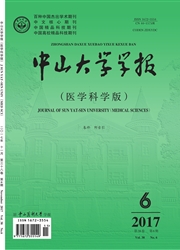

 中文摘要:
中文摘要:
【目的】本研究通过检测肝癌组织中全长型脾酪氨酸激酶SYK(L)的表达、与临床病理因素的相关性分析、以及细胞学实验等方法,探讨SYK(L)对肝癌侵袭与转移的影响。【方法】采用免疫组织化学方法检测211例肝癌组织及其匹配癌旁肝组织中SYK(L)的表达,分析其与临床病理因素的相关性;细胞学实验检测SYK(L)对肝癌细胞侵袭性的影响;并在临床标本中进一步验证SYK(L)与MMP9蛋白表达的相关性。【结果】211例肝癌组织中SYK(L)表达(41.2%,87/211)低于癌旁肝组织(92.4%,195/211)(P〈0.001);肝癌SYK(L)表达与术前AFP水平(P=0.012)、肿瘤直径(P=0.034)、卫星结节(P=0.015)、血管侵犯(P=0.003)和细胞分化程度(P=0.005)相关。Transwell小室侵袭性实验提示SYK(L)可抑制肝癌细胞的侵袭能力,且半定量RT-PCR检测发现SYK(L)可下调MMP9和MMP2 mRNA的表达水平。在211例肝癌组织中,SYK(L)与MMP9表达存在显著负相关(r=-0.601,P〈0.001)。【结论】肝癌中SYK(L)蛋白表达降低;SYK(L)可能通过抑制肝癌细胞的侵袭与转移,抑制肝癌的发生发展。
 英文摘要:
英文摘要:
[Objective] The aim of present study was to investigate the expression pattern, correlation with clinicopathologic variables and biologic functions of SYK(L), and to explore its possible effects on the invasion and metastasis of human hepatoeellular carcinoma (HCC). [Methods] The expression of SYK (L) was detected in 211 cases of HCC tissues and adjacent non-tumor liver tissues by immunohistochemistry. The relationship between the expression statues of SYK(L) and clinicopathological characteristics was analyzed. Then, we used an in vitro Matrigel assay to evaluate the effect of SYK (L) on cell invasiveness. Moreover, the correlation between SYK (L) and MMP0 protein levels in the 211 HCC tissues was further analyzed. [Results] The high-expression rate of SYK(L) was significantly lower in HCC tissues than in adjacent non-tumor tissues (41.2% vs. 92.4% ; P 〈 0.001 ) ; moreover, SYK (L) expression was significantly associated with the preoperative AFP level (P = 0.012), tumor size (P = 0.034), satellite nodule (P = 0.015), vascular invasion (P = 0.003) and tumor differentiation (P = 0.005). Matrigel assay in vitro demonstrated that SYK (L) exhibited markedly decreased the HCC ceils invasion, and the semi-quantitative RT-PCR analyses showed that SYK (L) expression lowered MMP2 and MMP9 mRNA level. In addition, there was an inverse correlation between the protein levels of SYK(L) and MMP9 in the 211 HCC tissues (r = -0.601, P 〈 0.001 ). [Conclusion] Down-regulation of SYK (L) protein expression may be involved in the carcinogenesis and metastasis of HCC.
 关于李斌奎:
关于李斌奎:
 关于元云飞:
关于元云飞:
 同期刊论文项目
同期刊论文项目
 同项目期刊论文
同项目期刊论文
 Expression and prognostic significance of CIP2A mRNA in hepatocellular carcinoma and nontumoral live
Expression and prognostic significance of CIP2A mRNA in hepatocellular carcinoma and nontumoral live Serum and glucocorticoid kinase 3 at 8q13.1 promotes cell proliferation and survival in hepatocellul
Serum and glucocorticoid kinase 3 at 8q13.1 promotes cell proliferation and survival in hepatocellul Partial hepatectomy for liver metastases from nasopharyngeal carcinoma: a comparative study and revi
Partial hepatectomy for liver metastases from nasopharyngeal carcinoma: a comparative study and revi The role of clinically significant portal hypertension in hepatic resection for hepatocellular carci
The role of clinically significant portal hypertension in hepatic resection for hepatocellular carci Hepatectomy Versus Hepatectomy With Lymphadenectomy in Hepatocellular Carcinoma A Prospective, Rando
Hepatectomy Versus Hepatectomy With Lymphadenectomy in Hepatocellular Carcinoma A Prospective, Rando Clinical features and outcome of multiple primary malignancies involving hepatocellular carcinoma: A
Clinical features and outcome of multiple primary malignancies involving hepatocellular carcinoma: A LIN28 expression and prognostic value in hepatocellular carcinoma patients who meet the Melan criter
LIN28 expression and prognostic value in hepatocellular carcinoma patients who meet the Melan criter Role of Sox2 and Oct 4 in predicting survival of hepatocellular carcinoma patients after hepatectomy
Role of Sox2 and Oct 4 in predicting survival of hepatocellular carcinoma patients after hepatectomy NADPH Oxidase DUOX1 and DUOX2 but not NOX4 are independent predictors in hepatocellular carcinoma af
NADPH Oxidase DUOX1 and DUOX2 but not NOX4 are independent predictors in hepatocellular carcinoma af Prognostic value of Wnt inhibitory factor-1 expression in hepatocellular carcinoma that is independe
Prognostic value of Wnt inhibitory factor-1 expression in hepatocellular carcinoma that is independe Application of tumor-node-metastasis staging 2002 version in locally advanced hepatocellular carcino
Application of tumor-node-metastasis staging 2002 version in locally advanced hepatocellular carcino CpG Island Methylator Phenotype Associated with Tumor Recurrence in Tumor-Node-Metastasis Stage I He
CpG Island Methylator Phenotype Associated with Tumor Recurrence in Tumor-Node-Metastasis Stage I He 期刊信息
期刊信息
